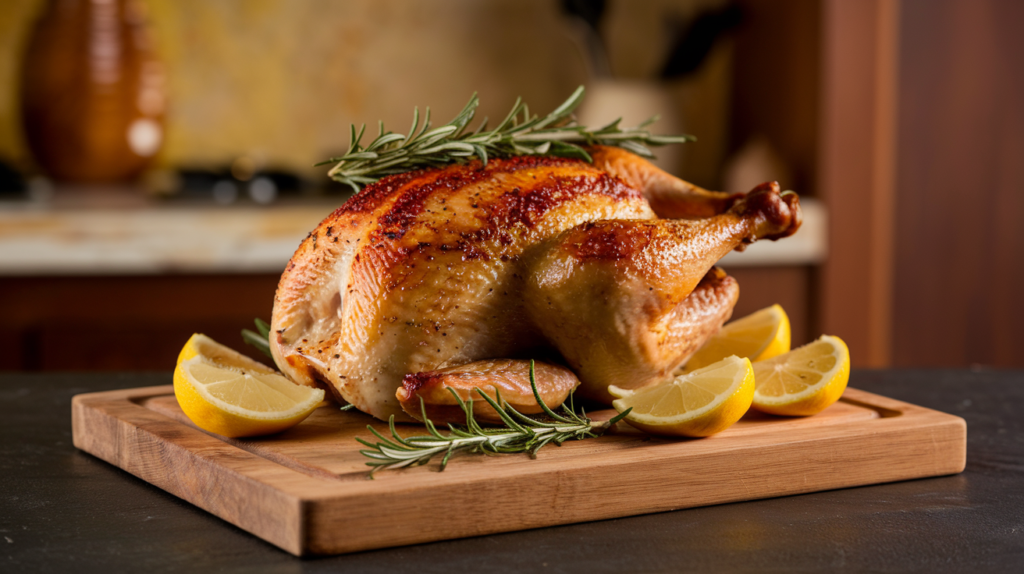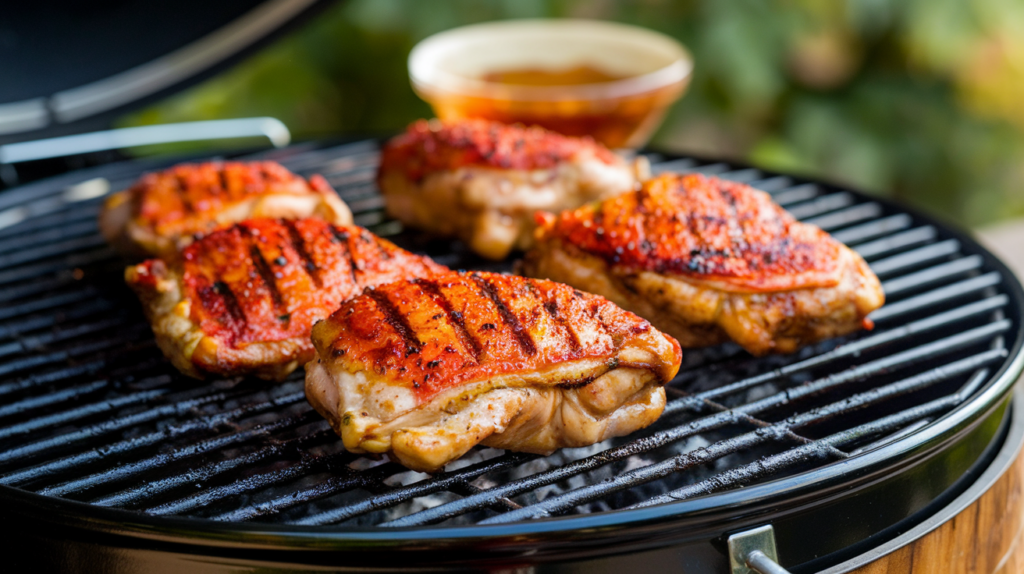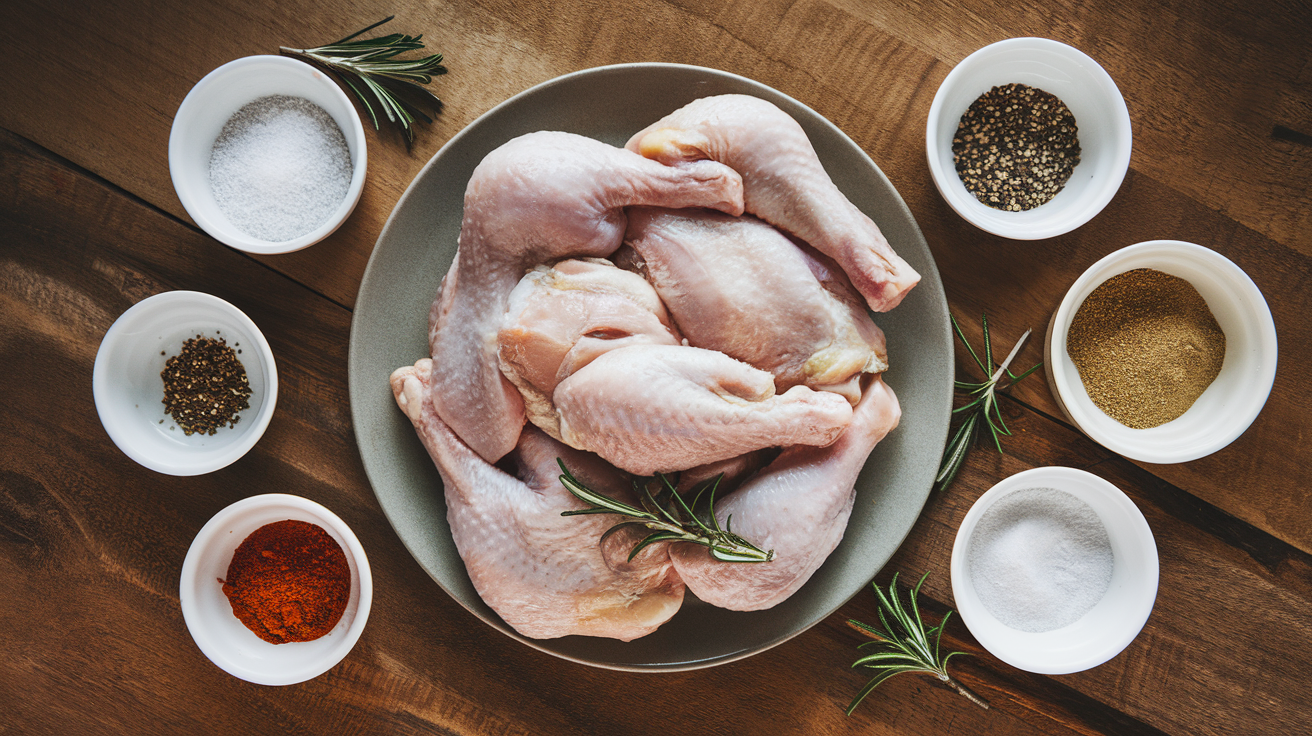Chicken, the culinary canvas, waits eagerly for the brushstrokes of seasoning that bring it to life. But here’s the age-old question: which seasoning truly sings in harmony with this versatile protein? Whether you’re roasting, grilling, frying, or baking, the right seasoning can transform your chicken from ordinary to extraordinary. But how do you decide? Let’s dive into the world of flavors, exploring possibilities that will leave your taste buds dancing.
“A perfectly seasoned chicken is like a symphony of flavors—every note playing in tune to create culinary magic.”
The Art of Seasoning Chicken
Seasoning chicken isn’t just a step in a recipe; it’s a ritual. Have you ever thought of chicken as a blank canvas waiting for your artistic flair? Much like a painter chooses colors, a cook selects spices and herbs to tell a flavorful story.
But here’s the thing: not all seasonings are created equal. What works wonders for grilled chicken might not hit the right note for fried chicken. Just as every artist has their muse, every type of chicken preparation has its ideal seasonings.
Why Seasoning Matters in Cooking
Imagine biting into a piece of bland chicken. It’s like listening to a song without the melody—empty and uninspiring. Seasoning is the melody that brings your chicken to life. It enhances the natural flavors, complements textures, and elevates your dish to new heights.
Think about it: would you prefer an unseasoned piece of grilled chicken, or one kissed with paprika, garlic, and a hint of thyme? Exactly. The right seasoning doesn’t just add flavor; it creates an experience.
Classic Seasonings for Chicken
Let’s start with the basics. These tried-and-true seasonings are the staples of every kitchen. They’re the dependable friends you can always count on to make your chicken shine.
Garlic and Onion Powder: The Foundation of Flavor
If salt and pepper are the foundation, garlic and onion powder are the beams that hold up the house of flavor. Garlic powder brings a rich, savory depth, while onion powder offers a subtle sweetness with a touch of umami. Together, they create a well-rounded base that complements virtually any cooking method.
Pro tip: Mix these powders with salt and pepper for an all-purpose seasoning blend that works wonders on chicken. Use it as a rub for roasted chicken or sprinkle it over thighs before grilling for effortless flavor.
Paprika and Smoked Paprika: Adding Color and Depth
Paprika isn’t just about adding a vibrant red hue to your chicken—it’s about bringing subtle sweetness and warmth. Regular paprika adds mild flavor, while smoked paprika delivers a robust, smoky note that’s perfect for grilled or roasted chicken.
Imagine a golden-brown piece of grilled chicken kissed with the deep, earthy notes of smoked paprika—it’s like a campfire in your mouth. Pair it with garlic powder and thyme for a seasoning mix that’s as comforting as it is delicious.
“Paprika isn’t just a spice; it’s the artist that paints your chicken with both flavor and beauty.”
Herbs: Adding Complexity and Aroma
While technically not a seasoning, fresh or dried herbs elevate chicken to new heights. Rosemary, thyme, oregano, and parsley add earthy, aromatic notes that can transform simple baked chicken into a gourmet delight.
For best results, rub fresh herbs under the skin of the chicken before roasting. This ensures the flavors infuse the meat as it cooks, giving every bite a burst of herby goodness.
These classic seasonings prove that you don’t need an elaborate spice rack to create mouthwatering chicken dishes. Sometimes, the basics are all you need to craft meals that are as comforting as they are flavorful.
“Paprika is the little black dress of spices—it works for almost any occasion.”

Exploring Global Flavors for Chicken
Why stick to the classics when you can take your taste buds on an international adventure? Chicken is like a passport that lets you explore the culinary landscapes of different cultures.
Italian Seasoning: A Mediterranean Touch
Picture this: a blend of oregano, basil, rosemary, and thyme hugging your chicken like a warm Mediterranean breeze. Italian seasoning is perfect for baked or roasted chicken, especially when paired with a squeeze of lemon.
Curry Powder: Eastern Aromatics
If you want to spice things up, curry powder is your go-to.
Pair it with coconut milk for a creamy curry that’s nothing short of heavenly.
Cajun and Creole Blends: Southern Spice
Want a taste of the American South? Cajun and Creole seasonings pack a punch with spices like paprika, cayenne, garlic, and oregano. It’s the perfect choice for fried or blackened chicken.
Asian Five-Spice: A Unique Fusion
For something truly unique, try Asian five-spice. Its blend of star anise, cloves, cinnamon, fennel, and Szechuan peppercorns creates a sweet and spicy symphony that pairs beautifully with stir-fried chicken.
Herbs That Pair Perfectly with Chicken
Herbs are like the unsung heroes of seasoning. They may not steal the spotlight, but they make sure every other flavor shines.
Fresh Herbs: Parsley, Thyme, and Basil
Fresh herbs bring a burst of flavor and aroma that dried ones simply can’t match. Parsley adds a light, grassy note, thyme delivers earthiness, and basil offers a hint of sweetness.
Imagine a roasted chicken with sprigs of thyme tucked under the skin—pure perfection.
Dried Herbs: Oregano and Rosemary
Dried herbs are more concentrated, making them ideal for long cooking processes like braising or baking. Oregano adds a touch of the Mediterranean, while rosemary lends a piney, slightly woody flavor that’s unmistakable.
Sweet and Spicy Seasoning Options
Who says chicken can’t be adventurous? Mixing sweet and spicy flavors is like adding a plot twist to your culinary story.
Honey Mustard Seasoning
Honey mustard isn’t just for dipping. Combine honey, mustard powder, and a pinch of cayenne to create a glaze that caramelizes beautifully on grilled chicken.
Chili and Brown Sugar Blends
Sweet meets heat in this irresistible combination. The sugar caramelizes as it cooks, creating a crispy, flavorful crust that’s perfect for baked or fried chicken.
Customizing Seasoning for Chicken Recipes
One size does not fit all when it comes to chicken seasoning. Different cooking methods call for tailored spice blends that maximize flavor and complement the preparation. Let’s explore how to customize seasoning for various chicken dishes.
Grilled Chicken Seasoning Ideas
Grilled chicken is all about bold, smoky flavors. A great seasoning for grilling starts with a base of salt and pepper, then builds with spices that can withstand high heat. Paprika, garlic powder, and cumin are fantastic additions.
For a Mediterranean twist, consider adding a mix of lemon zest, oregano, and a touch of smoked paprika. Want to go tropical? Toss in some allspice and a pinch of cinnamon for a Caribbean-inspired jerk seasoning.
Pro Tip: Rub your spices on the chicken at least 30 minutes before grilling to allow the flavors to seep into the meat. It’s like letting your chicken take a flavorful nap before the main event.
Baked Chicken Flavor Profiles
Baked chicken thrives on seasonings that can deepen as they cook. Herbs like rosemary and thyme are ideal for creating a comforting, homey flavor. For a crispy crust, add breadcrumbs mixed with grated Parmesan and Italian herbs.
Craving something sweet and tangy? Mix honey, Dijon mustard, and soy sauce into a glaze. This combination caramelizes beautifully in the oven, creating a golden, sticky coating.
“A perfectly baked chicken is like a warm hug—it’s comforting, satisfying, and impossible to resist.”
Seasoning for Fried Chicken
When it comes to fried chicken, it’s all about creating a well-seasoned crust. The secret lies in your flour mixture. Add paprika, cayenne, garlic powder, and onion powder for a classic Southern flavor.
Want to elevate it? Mix in a dash of celery salt or ground mustard for a subtle zing. And don’t forget to season the buttermilk or egg wash to ensure the flavor penetrates the chicken, not just the crust.
Common Mistakes to Avoid When Seasoning Chicken
Even the best seasonings can fall flat if misused. Avoid these common pitfalls to ensure your chicken always tastes like a masterpiece.
Overseasoning or Oversearing
There’s a fine line between well-seasoned and over-seasoned. Heavy-handed seasoning can overwhelm the natural flavor of chicken. Always start light—you can always add more later.
Similarly, burning your seasoning during cooking (especially with high-heat methods like grilling) can create bitterness. Keep an eye on the flame and avoid direct contact with extreme heat when using sugar-based blends.
Not Allowing Seasoning to Rest
Good things take time, and seasoning is no exception. If you sprinkle spices on your chicken and immediately cook it, you miss out on a world of flavor.
Allow the chicken to rest with the seasoning for at least 30 minutes, or better yet, overnight. This lets the spices permeate the meat, creating a depth of flavor that a quick sprinkle can’t achieve.

FAQS
To tie everything together, let’s address some of the most common questions about seasoning chicken.
Can I Season Chicken Overnight?
Absolutely! In fact, seasoning your chicken overnight is one of the best ways to enhance flavor. Use a dry rub or marinade, cover the chicken, and refrigerate it. This extended resting time allows the seasoning to deeply penetrate the meat, making every bite flavorful.
What’s the Best Seasoning for a Whole Chicken?
Seasoning a whole chicken requires a blend that balances the skin and the meat. A mix of salt, pepper, garlic powder, paprika, and fresh rosemary works wonders. Don’t forget to season the cavity of the chicken for even flavor distribution.
Are Dry Rubs Better Than Marinades?
It depends on your goal. Dry rubs are ideal for grilling or baking as they create a flavorful crust. Marinades, on the other hand, infuse moisture and flavor, making them perfect for leaner cuts or when roasting.
What Is Mexican Seasoning Made Of?
Mexican seasoning is a robust blend of spices and herbs that embody the bold and vibrant flavors of Mexican cuisine. At its core, Mexican seasoning combines chili powder, cumin, paprika, and garlic powder. These spices create a savory, smoky, and slightly spicy base. Often, onion powder, oregano (specifically Mexican oregano), and cayenne pepper are added for depth and a hint of heat.
For an authentic touch, some blends include ground coriander for a citrusy note and a pinch of cinnamon to echo the subtle sweetness found in traditional Mexican dishes. Salt balances the flavors, while dried lime zest or powder may be added for a tangy finish.
“Mexican seasoning is like a fiesta in your spice jar—lively, colorful, and full of flavor.”
This versatile mix is used in everything from enchiladas to roasted vegetables, making it a pantry essential for anyone who loves bold flavors.
Which Seasoning Goes Well With Chicken?
Chicken is a versatile protein that pairs beautifully with a wide range of seasonings, but the best choice depends on your desired flavor profile. If you’re after simplicity, salt and pepper are the foundation. For added depth, garlic powder, onion powder, and paprika make excellent companions. These staples enhance chicken’s natural flavor without overwhelming it.
Want something adventurous? Try seasoning chicken with Italian herbs like oregano, thyme, and basil for a Mediterranean twist. If you’re craving spice, Cajun or Creole blends bring a fiery kick, while curry powder offers warm, aromatic notes.
For global inspiration, Mexican seasoning pairs wonderfully with chicken, especially in tacos or fajitas. Asian five-spice creates a sweet and savory balance, while Middle Eastern za’atar adds an earthy, nutty profile.
Ultimately, the perfect seasoning for chicken is the one that satisfies your taste buds and complements your dish.
Is Mexican Seasoning the Same as Taco Seasoning?
Mexican seasoning and taco seasoning share many similarities but are not identical. Both blends include a base of chili powder, cumin, and garlic powder. However, taco seasoning often has a more specific flavor profile tailored to tacos.
Taco seasoning typically includes paprika, onion powder, and oregano, but it also has additional ingredients like sugar or cornstarch. These components help balance the spice and create a slightly thicker consistency, especially when mixed with water to make a sauce or filling for tacos.
In contrast, Mexican seasoning is more general-purpose, designed for a variety of dishes beyond tacos. It leans heavily on bold, smoky flavors without the sweet or saucy elements of taco seasoning. While you can interchange the two in some recipes, each serves a distinct purpose in Mexican cooking.
Does Taco Seasoning Work on Chicken?
Absolutely! Taco seasoning is a fantastic choice for chicken, especially if you’re preparing dishes like chicken tacos, quesadillas, or enchiladas. The blend of spices enhances the chicken with bold, smoky, and slightly spicy flavors that complement Mexican dishes perfectly.
For best results, coat your chicken generously with taco seasoning before grilling, baking, or sautéing. To create a saucy texture, mix the seasoning with a bit of oil and lime juice before marinating the chicken.
Taco seasoning works equally well on chicken breast, thighs, or even ground chicken. Whether you’re aiming for crispy taco fillings or tender, saucy chicken, taco seasoning brings out the best in this versatile meat.
“With taco seasoning, your chicken transforms into a flavor-packed superstar ready to steal the show.”
Conclusion:
Seasoning chicken is an art that blends creativity, technique, and a love for flavor. Whether you’re using a simple salt-and-pepper mix or an elaborate blend of global spices, the key is to let your seasoning complement the dish and cooking method.
Remember, cooking is all about experimenting. Don’t be afraid to try new combinations or tweak existing ones to suit your taste. After all, the best seasoning is the one that makes you and your loved ones smile with every bite.
“Cooking isn’t just about feeding the body—it’s about nourishing the soul.”

